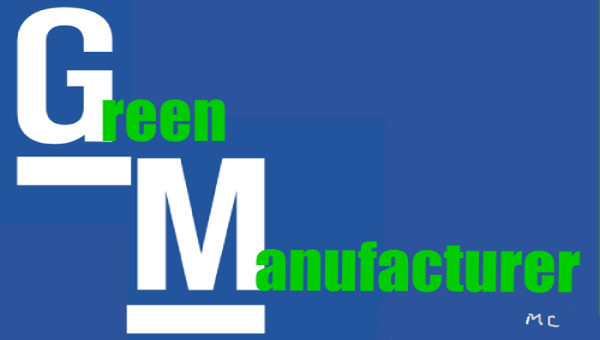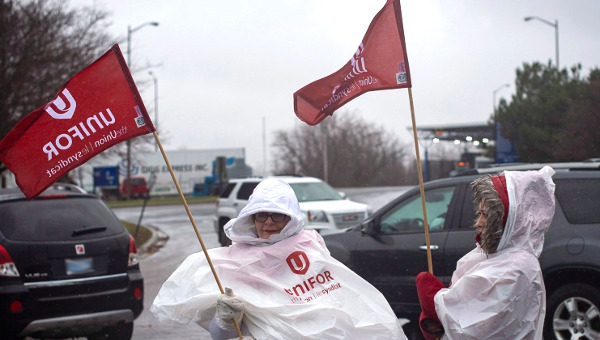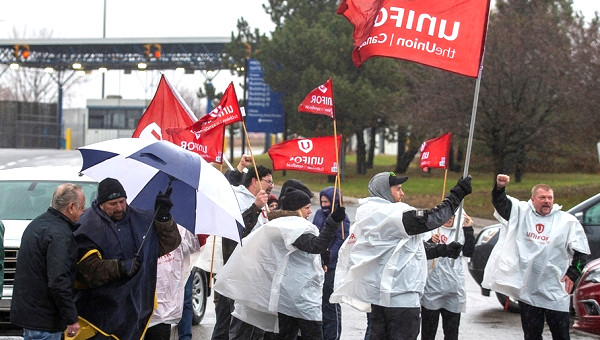Oshawa and Postal Workers: Big and Small Lies We Accept
In 1979, Canada’s postal union (CUPW) bargained and bargained with the employer. Eventually, having exhausted all possibilities, it made the decision, supported by a huge majority of its voting members, that its members would no longer provide their services on the basis of the existing terms and conditions of the now expired collective agreement. Workers had determined, democratically, not to sell their labour power on those terms. In a liberal democracy, they had every right to take such a decision. Only a slave society would deny them this right.
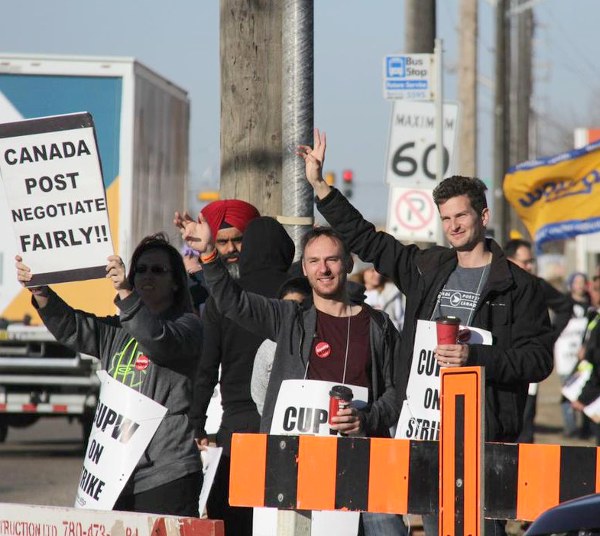 The government of Canada decided otherwise. Unlike the union it did not consult its constituency. It enacted legislation to order the postal union and its workers to call off the strike, to sort and deliver the mail. They would be paid the amounts they were entitled to under the old agreement until an arbitrator would impose some other ones on them. The leadership of the union was legislatively instructed to tell its members that the strike was no longer legal, no longer legitimate. They were told what to say; they were told to say that they had not led their members properly and that their democratic practices were not worth a tinker’s cuss.
The government of Canada decided otherwise. Unlike the union it did not consult its constituency. It enacted legislation to order the postal union and its workers to call off the strike, to sort and deliver the mail. They would be paid the amounts they were entitled to under the old agreement until an arbitrator would impose some other ones on them. The leadership of the union was legislatively instructed to tell its members that the strike was no longer legal, no longer legitimate. They were told what to say; they were told to say that they had not led their members properly and that their democratic practices were not worth a tinker’s cuss.
Jean-Claude Parrot, a union leader with principles, said he could not do that. He was prosecuted for this act of defiance, for this insistence on his right of belief, of his right to think and speak as he chose. The prosecution opened its case as follows: “The sole question for this court is: Who runs this country – the government or the unions?” Parrot was convicted and spent three months in jail. The workers were forced to go back to work on properly rejected terms and conditions. While the jailing of a trade union leader is rare today, forcing workers to work on terms and conditions they do not want to accept is a norm in this freedom-loving country.
The justification for such oppression is based on a big lie. This lie is that Canada is a liberal democracy.
Forced Back-to-Work
A properly elected government has plenary powers to act on its free, and freely-participating citizens, to act on their behalf to ensure the welfare of the polity. In doing so it may take away some of the rights of the people, such as freedom to speak, assemble, associate, as long as the government can persuade a court that it is curtailing these rights by introducing measures that are reasonably compatible with the tenets of a free and democratic society. Forcing workers to accept terms of employment they were legally entitled to reject is considered to be compatible with our basic democratic principles as long as the government is reasonable in its belief that it is coercing workers to serve the public good. Over and over, back-to-work legislation is justified on the basis that the otherwise legal goals of workers may harm the public good. A government charged with looking after the general welfare of the nation is entitled to say that it has no option but to act to save the public from harm.
This November, we heard this bombastic, worker-hurting, claim again. Photos of allegedly mail-laden trucks in depots (shades of Colin Powell and his visuals of Saddam Hussein’s weapon-laden trucks) are said to be evidence of how selfish workers are creating chaos and intolerable hardship. This cannot be tolerated. After all, workers merely want a better deal for themselves, heedless of society’s needs. It is true that, abiding by the legal rules which allow workers to use collective economic action to pursue their claims, postal workers conducted some rotating strikes to pressure the employer to be more pliable. This is what free collective bargaining is designed to permit. But, once again, our government felt that it just had to override the workers’ rights, rights that had been won after long political struggles. Prime Minister Justin Trudeau, his flunkies and the mainstream media repeatedly told us that the workers’ self-serving rotating strikes were anti-social and could not be allowed to inconvenience the innocent, particularly small businesses whose selfish needs required protection. So, our liberal democratic government said: “Back to work, you greedy, intransigent, anti-public welfare unionists!”
Then General Motors (GM) announced that it was no longer satisfied with its market conditions. It exercised its right to take its property and run. It is going to close four North American plants. Oshawa is one of those. Now this will do the public a lot of harm. I know this because the same people who attack postal workers are telling me this. Trudeau, his flunkies and the mainstream media are in agreement. Stories about how expectations will not be met, how sad loyal workers are to lose jobs of which they had been proud, how many families would be pushed into poverty, how much incidental harm would be inflicted, filled our television screens and newspapers. Everyone expressed anxiety and indignation at the anti-social, self-serving, behaviour, by General Motors. Premier Doug Ford said he was distressed. Prime Minister Trudeau said he was very distressed. Andrea Horwath was seen hugging upset workers at the stricken plant. All said they would do their best to help the hurt people. No one said they would order the anti-social, public harm-doing General Motors back to work.
The big lie is in the open.
Liberal Capitalist Democracy
We are not a liberal democracy but a liberal capitalist democracy and the most important part of that phrase is ‘capitalist’. It is the capitalists who set the limits of liberalism’s and democracy’s scope.
In a capitalist society, the owners of the means of production are only technically subject to governmental power. More often than not, government acts as the inferior party in the relationship between private power and elected government. Hence the chasm between the caterwauling and lamentations about the GM Oshawa decision and the lack of any decisive response to the flexing of General Motors’ muscles. The sacrosanct nature of private property gives capitalists enormous political sway over governments that depend for their legitimacy and survival on the deployment of private capital to generate overall welfare. It is conventional wisdom that, even to suggest that the owners of wealth owe any of us an obligation to invest, and keep invested, some of that wealth, offends the basic sense of justice embedded in our liberal democracy. ‘Sensible’ people, political parties, and most unions recite a catechism. It would lead – understandably and rightly – to instant withdrawal of all capitalists from our economy and then where would we be? There it is.
Self-seeking activities by workers who produce all the wealth may be fettered, especially when it suits capital to have this done. It makes sense to lower a minimum wage, dilute a health and safety regulation, make unemployment benefits more difficult to get, smash unions and their capacities to collectivize workers’ bargaining powers, but it makes no sense to inhibit capital if it can be avoided. Indeed, we are to be grateful to capitalists for even thinking about investing their wealth. We should entice them to do so; we should cajole them; we should subsidize them. They are to be treated differently, specially, they are to be privileged. This does not jibe with a liberal democracy, but it fits a political liberal capitalist democracy in which ‘capitalist’ imbues the phrase with its real meaning.
We all know these things and still do nothing. The proof is in the eating of the pudding.
Government Generosity
In 2009, General Motors had fallen on hard times. It suspended the payment of all its debts. Its creditors were about to be left empty-handed; its workers faced a bleak future. The Barack Obama administration stepped-in. It bought 60.8 million shares for around $50-billion. In other words, it gave GM the sort of bail-out it had given those pernicious banksters who brought us the subprime mortgage and other frauds. Obama, however, asked that everybody at GM help out. By everybody, he meant workers. Concessions were imposed on the United Automobile Workers (UAW) and workers as healthcare and pension obligations were downloaded and newly hired workers would not be offered the deals automobile workers had won after many quite heroic struggles. Canada, of course, obliged GM as well, purchasing some of its shares, filling GM’s coffers. In due course, by 2015, the governments of Canada and Ontario sold their shares back for circa $4-billion, through banks like Goldman Sachs who made a handy profit on those transactions (and, to digress, when Obama bailed out the banks, Goldman Sachs was given a slice of those monies by being declared an eligible bank literally hours before the bail-out was announced).
For a moment, governments had a realistic capacity to direct a huge automobile company to serve the workers and consumers better than a for-profit corporation would ever do. This was never perceived to be a realistic notion. In a liberal capitalist democracy we are in the business to serve capital, not the working class.
The bail-out worked and GM enjoyed 15 quarters of profits, realizing $20-billion in net income. This made some people very happy. It was not the tax-payers. The guesstimate is that the Obama administration sold its equity in GM at a loss approximating $10-billion. But investors were very happy. Dividends to shareholders were increased. In March of this year, the financial papers reported that a hedge fund manager with a large stake in GM was urging it to buy back its shares on the market. Once shares are bought back, share prices rise as there are now less claims on the corporation’s assets and profits. Incumbent shareholders such as the hedge fund in question and, usually, the executives who make the decision to buy back shares, make out like bandits.
All this government generosity should have made GM grateful to government. But no.
In 2016 they were back at the beggars’ table (or, more accurately, the blackmailers’ table). They told the Canadian and Ontario governments that things were tough and the Oshawa plant needed help to stay modern and viable. More money was dumped into the bottomless GM pot. And now, barely two years later, having made promises to governments and workers that they would share in the expected bounty, they tell us that, “sorry, we can get a better deal elsewhere.” And we are dismayed. But surely not surprised?
We do this all the time. On the same day that the Oshawa debacle hit our media, it was announced that the government of Ontario was providing Maple Leaf Foods with $34.5-million to help it to set up a plant in London, Ontario, to off-set the shutting of plants elsewhere. The federal government will add to this largesse by promising to help poor Maple Leaf Foods out with $29-million of our monies. And, recently, we went through the unseemly exercise of trying to bribe Amazon, a noted exploiter of workers and of our porous tax raising systems, to put their headquarters here rather than in some other misguided and begging city (luckily we lost). And the Institute for Policy Studies reported in 2018 that the most subsidized corporations pay their executives far more than do other less successful mendicant corporations. Thus, in 2017, there was a fuss when it was revealed that Bombardier’s executives had improved their remuneration by $32.6-million just when the federal government had given it a loan of $372.5-million and Quebec had chipped-in with $1-billion of its tax-payers’ money.
They take. We give. They promise. They do not honour their promises. They threaten and menace to legally withhold their wealth. They hold us to ransom. We give in. All too often, we save capitalists the trouble of putting us to the sword. We anticipate their demands and just make them offers. Workers seek to legally withhold their only wealth, their labour power. We (and who precisely is this ‘we’?) do not give in. We force them to accept terms that they have already legally refused. We will not allow them to hold society to ransom. We will not allow them to be anti-social. This happens to suit the capitalist agenda – a coincidence, no doubt. To clarify: if the undelivered mail was such a crisis, why did the government of Canada not tell Canada Post to give workers what they were demanding? I am sure workers would have taken those trucks out of the depots. But that would have set a bad example: employers might be forced to do things for the general good and then where would a capitalist society be?! We rather beg the owners of the means of production (who hide behind corporations) to think about acting as if they were socially responsible.
It Takes Two Classes to Wage War
We practise the politics of compromise and indignation. We accept that there is no alternative to capitalist domination. They wage class war on us. They insist in passing on the costs of making profits onto workers and their communities. We talk about retraining dispossessed workers, to sustain them enough to let them survive while things are done to change the economic base of their communities, and the like. They just take the money and run.
We do not say: “People have profitted from our generosity and are now using those profits to make more profits elsewhere while not sharing any of it with us. It is thievery.” We do not say: “This kind of economy is a fraud and is run for rapacious thieves and they should be made to pay.” No, that would involve us in engaging in class warfare and everyone knows that this goes against the very assumptions of a liberal democracy. We have internalized the big lie, namely that we have a liberal democracy, rather than a liberal democracy subjugated to the capitalist project. Oshawa provides an opportunity to re-consider.
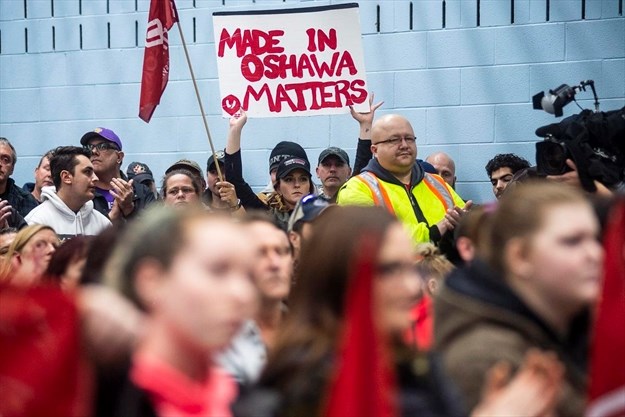 Freeze all the profits made by shareholders in General Motors who have been enjoying the fruits of hand-outs given on the basis of promises that have been deliberately dishonoured, again and again. Note here that it may be technically difficult but note that it is a logical demand. We do it when it suits the government’s and the dominant class’ political agendas. We freeze the assets of Iranians, Venezuelans, Russians, etc., when we want to protect foreigners who have allegedly been victimized by these supposed wrongdoers. Some capitalists (not ours) will not be protected. Why not go after those GM folk who have profitted at Canadians’ expense? When General Motors made its long-planned announcement of the impending closures (one of the many lies told included the suggestion that these closures were not long in the planning!), the value of General Motors went up by a giddy 4.8%. The costs were going to go down and the accumulated assets that included the many hand-out monies would be worth even more than before. Investors saw a golden chance to make money. Our workers’ deliberately engineered misery is the source of new riches for the already rich.
Freeze all the profits made by shareholders in General Motors who have been enjoying the fruits of hand-outs given on the basis of promises that have been deliberately dishonoured, again and again. Note here that it may be technically difficult but note that it is a logical demand. We do it when it suits the government’s and the dominant class’ political agendas. We freeze the assets of Iranians, Venezuelans, Russians, etc., when we want to protect foreigners who have allegedly been victimized by these supposed wrongdoers. Some capitalists (not ours) will not be protected. Why not go after those GM folk who have profitted at Canadians’ expense? When General Motors made its long-planned announcement of the impending closures (one of the many lies told included the suggestion that these closures were not long in the planning!), the value of General Motors went up by a giddy 4.8%. The costs were going to go down and the accumulated assets that included the many hand-out monies would be worth even more than before. Investors saw a golden chance to make money. Our workers’ deliberately engineered misery is the source of new riches for the already rich.
Demand that General Motors’ Canadian assets become ours. Not only have we contributed to their accumulation, General Motors has acted anti-socially and no longer deserve to have its property protected, no more so than a blackmailer or one who obtains property by false pretences is allowed to keep his ill-gotten gains.
Public or worker ownership of the plant should be the way to go, using the considerable technology, equipment and honed skills of the workers to be put to the production of socially necessary goods, for instance, public transit infrastructure.
These and more elaborated and detailed like demands should be fashioned. It is the nature of the demands, not their immediate feasibility, that will matter. They will be an announcement that business as usual is not to be tolerated. It is harmful to our health and well-being. It privileges power and fraud. Such demands, demands for regime change, may help raise consciousness about the lies we tell each other, lies that serve capitalists rather than the working class. The demands should be articulated by workers, their unions, progressive allies and wannabe leftist political parties and actors. Oshawa has provided an opportunity to ask: “Whose side are you on?” •



